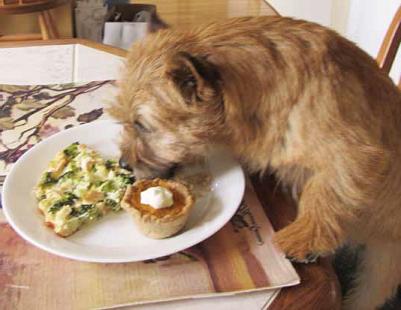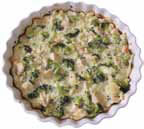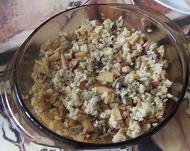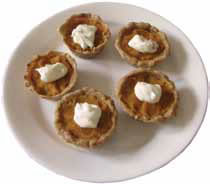Share the Feast: Thanksgiving Recipes for Dogs

Here’s a healthy meal that will cause your four-legged family members to celebrate!
Article by Mary Straus, published in the Whole Dog Journal, November 2012
Etta (right), one of our designated taste testers, happily takes her place at the kitchen table to sample the results of the recipes found below. Her favorite, as you can see, was the dressing.
Introduction
Thanksgiving is a time when families gather together to enjoy good food and to remember all the things we have to be grateful for. Unfortunately, one part of our family often gets left out – our dogs! It must be frustrating for them to smell all the wonderful aromas coming from the kitchen, but not be able to share in the feast. We’re here to relieve that vexing situatin with recipes for some healthy Thanksgiving dishes just for them.
Below are recipes you can use to give your dogs a special treat on this wonderful holiday, or to use up leftovers afterwards. Note these recipes are fine to feed occasionally, but they are not a complete diet.
One serving of each of the three recipes together, or three servings of either of the first two recipes alone, would provide a complete meal for a dog weighing about 25 pounds. One serving of any of the three recipes individually could be used to supplement the same dog’s regular diet (reduce the amount you usually feed by one-third to account for the extra calories). All recipes are low in fat, and leftovers can be frozen for later use.
Why shouldn’t they just share our dinner?
We are warned over and over again that sharing human food with dogs can be dangerous. That’s true if you’re sharing fatty foods or scraps, such as turkey skin or pan drippings, cheese, bacon, or butter. Too much fat can lead to pancreatitis, particularly in dogs accustomed to eating a low-fat commercial diet. Sugary treats such as pumpkin pie are also not a good idea, since they may cause tummy upset, as well as providing unneeded calories that contribute to obesity. Cooked bones can perforate the esophagus, stomach, or intestines and cause impactions, and should never be fed to dogs.
In addition to these foods, certain ingredients can cause problems for dogs, including:
- Xylitol, used as a sugar substitute in some baked goods, peanut butter, sugar-free gum, candy, and toothpaste, can cause life-threatening hypoglycemia in dogs, even in small amounts – as little as five sticks of sugar-free gum can sicken a 44-pound dog.
- Macadamia nuts can cause paralysis; fortunately this resolves on its own within about 24 hours.
- Grapes and raisins can cause kidney failure in dogs.
- Onions cause a form of anemia and should not be fed (very small amounts in leftovers would be okay). Garlic is similar but much less potent, so small amounts can be used for flavoring.
- Nutmeg and sage are safe in very small amounts, but too much can cause gastrointestinal upset and central nervous system depression or excitement.
- Chocolate, coffee, and caffeine are all dangerous for dogs (dark chocolate is more toxic than milk chocolate).
- Yeast dough can expand in the dog’s stomach causing pain and even rupture.
- Milk can cause stomach upset due to lactose intolerance (yogurt and cottage cheese are low in lactose and are good to feed)
Okay to share
There are many foods that can be safely shared with dogs. As long as your dog doesn’t have a health problem that requires a special diet, there’s no reason you can’t feed a special meal on this holiday. Just be careful what you offer. Make good choices and limit amounts to help your dog enjoy the holiday without suffering from overindulgence afterward.
Some foods, such as turkey meat (without the skin) can be shared without needing any special preparation, but other dishes may require changes to make them appropriate for dogs. Set aside a portion during preparation, before adding butter, cheese, sugar, onions, or other high-fat and high-calorie ingredients, to make servings appropriate for dogs.
Try putting food into a Kong or other hollow toy. Your dog will enjoy the challenge of removing his treat, and the task will keep your dog occupied while the rest of the family enjoys their dinner. Add plain yogurt and freeze ahead of time to make the treat last even longer.
Healthy substitutes for dogs
| Instead of this: | Feed this: |
| Turkey skin or drippings | Turkey meat (skinless) |
| Fatty ham scraps | Lean ham meat |
| Cooked bones | Giblets (not too much at one time) |
| Gravy made from drippings | Low-fat gravy |
| Stuffing with onions | Stuffing without onions |
| Candied yams covered with marshmallows | Sweet potato or yams |
| Mashed potatoes with butter | Plain mashed potatoes |
| Baked potato with butter and sour cream | Baked potato with plain yogurt |
| Cheese and sausage | Celery or carrot sticks |
| Green bean casserole with onions | Green beans |
| Broccoli casserole with cheese | Broccoli |
| Brussels sprouts with bacon | Brussels sprouts (a few bacon bits won’t hurt) |
| Pearl onions | Creamed corn |
| Applesauce with added sugar | Unsweetened applesauce |
| Grapes or raisins | Blueberries and dried cranberries |
| Apple pie | Apple slices |
| Berry pie | Berries |
| Pumpkin pie | Canned pumpkin |
| Nutmeg | Cinnamon |
| Whipped cream or other milk products | Yogurt (plain) |
| Alcohol | Water flavored with low-fat gravy |
Recipes? We don’t need no stinkin’ recipes!
Anyone who knows me well knows that I don’t cook, so when I was asked to create some Thanksgiving recipes for dogs, I panicked. Recipes? I’m the one who has argued against the use of recipes for homemade diets (I prefer diet guidelines so that the same food is not fed every day), and against the need to create special recipes for dogs using multiple ingredients and flavorings more suitable for human palates. While it’s hard for me to imagine, however, I realize that some people actually enjoy cooking, and may find it especially gratifying to prepare a special and healthy holiday treat for their dogs.
In desperation, I appealed to my friend Jill Petersen, of Kenmore, Washington, who not only volunteered to help me create the recipes, but also tried them out on her own dogs. Etta, her Norwich Terrier, was the first to volunteer for the “sniff and taste” test, and she gave an enthusiastic two paws up to all the dishes (her favorite was the giblets and rice dish).
My primary goals with these recipes were to ensure that they were each low in fat and included only ingredients that are good for dogs, so that the usual holiday warnings would not apply. It was harder than I expected; I was surprised at the amount of added fat in many dishes. I almost despaired of finding a low-fat, low-calorie pie crust; the low-fat versions substituted light Karo syrup for butter or oil, and there was no way I was going to tell people to feed that to their dogs! Once again, Jill saved the day with her oatmeal and applesauce crust. I want to say thanks to Jill and her taste testers: Etta, Raisin’ (a 15-year-old Cairn Terrier), and Chip (a 12-year-old Norwich Terrier). I could not have done this without you.
I regret that I no longer have much time to respond to questions. See my Contact page for more information. My name is Mary Straus and you can email me at either or



